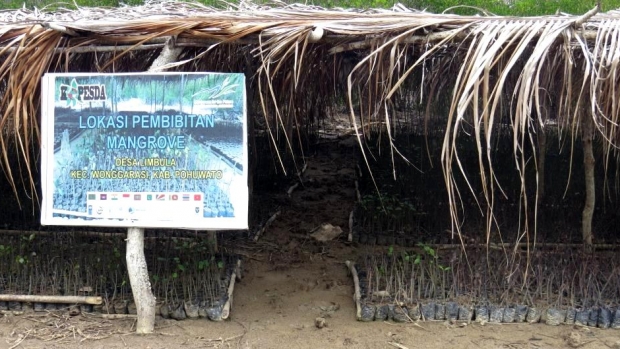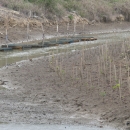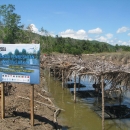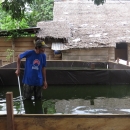Grants :: Small Grant Facilities :: Facilitating Freshwater Aquaculture and Mud Crab Rearing by Women's Group in Limbula Village
Facilitating Freshwater Aquaculture and Mud Crab Rearing by Women's Group in Limbula Village

Mangrove nursery, Limbula village, Wonggarasi District, Pohuwato Regency, Gorontalo Province © MFF IUCN, 2015
Objectives
To improve mangrove ecosystem and to improve women’s group livelihood
Background
Limbula villagers depend on fishing and the mangrove forest for their livelihood. However, the lure of high economic returns from wide-scale commercial aquaculture influences the unsustainable use (often by conversion into aquaculture ponds) of the mangrove forest. In the last 10 years alone, 304 hectares of mangroves have been converted into aquaculture ponds; only 15 hectares of mangroves are left, and in degraded condition. This unsustainable commercial practice is often exacerbated by a lack of understanding about the importance of a healthy mangrove ecosystem, and about available "mangrove-friendly" livelihoods. The project, through introduction of sustainable livelihood activities, such as mangrove crab raising and freshwater fish farming, will address the lack of awareness in the village, and improve the conservation and protection of Limbula Village's remaining mangrove forests.
Target beneficiaries
The direct beneficiaries include 2 groups of fishermen and women, in particular 11 households (5 households to benefit from mangrove crab raising; 6 from freshwater fish farming). Indirectly, the project will benefit the Limbula villagers (at least 40 people).
Outputs
- Community members from 11 low income households received training on freshwater catfish and mud-crab husbandry;
- 6 units of 16 m2 plastic pond were built where 6,800 catfish juveniles were deployed. 6 farmers (members of farmer group) managed the ponds;
- 20 floating cages were built and 600 mud-crab juveniles deployed. 5 farmers managed the cages;
- 30,000 mangrove seedlings were planted to rehabilitate 3 ha area along riverbanks and creek dykes. The growth rate was 93%.
Accomplishments and challenges
- Two community groups were established during the initiation of the project;
- The following training activities had been implemented, prior to the implementation of the rehabilitation and livelihood activities:
- A “diskusi kampong” (kampong/sub-village) discussion had been held on October 2014, attended by almost 70 people representing village government, village parliament, informal leaders and all community group members. The discussion aimed on the socialization, communication and evaluation of the MFF programme. One of the main output was the designation of the community group activities (crab fattening and pilot silvofishery) and sign of agreement between village government and community group;
- A training on the caged crab culture had been implemented for 2 days, participated by 20 women group members and 1 male silvofishery member. The training was facilitated by District Marine and Fisheries Office. In addition, some village office officials were also participated on the training.
- A total of 50% of 40,000 Ceriops sp. seedlings were survived in the nurseries. The additional 3,100 seedlings (2,500 Ceriops sp, 500 Rhizopora sp, and 100 Bruguiera) had been planted in the nurseries. All seedlings in the nursery had been planted in the restoration areas. The remaining seedlings, about 55,000 seedlings, were planted directly in the project areas. The high mortality of the seedlings was mostly caused by the long dry season in the area, as marked by the continuous operation of salt-making in the fish-pond areas. Total rehabilitation areas: 5 ha;
- The following activities had been implemented aimed on improve community’s livelihood:
- Provision of crab fattening facilities (boxed crab cages) to women group members. As recommendation of the trainer, a total of twenty 2 x 1 meter crab cages have been built and provided to the women group. These bamboo/wood and trawl net-made cage were divided into 20 x 15 cm chambers to hold each crab. The cage model, which locally known as “Battery system cage”, of which the crabs are located separately, are designed to anticipate and control the growth of the crab and reduce the mortality rate due to their cannibalism. This is a modification from the previous planned cage which were designed that all crabs to be placed at the same bigger room cage;
- A total of 400 juvenile crabs had been distributed to community groups to be cultured on the cages;
- Crab capture nets had been provided to each group;
- Fair engagement of both women and man wass very much visible in both planting as well as livelihood activities;
- Community groups were very actively engaged on the programme, including some self-initiated activities. The increased understanding of the community group members on the objective of the programme and active engagement of the group members to provide input are resulted from fully support of village government, especially the leadership of (Female) Head of Village;
- In contrast, Grantee showed poor performance and still needed improving in terms of their understanding and initiative to align the community willingness into the accomplishment of MFF supported objectives.
Contributions to cross-cutting themes
- Climate change and disaster risk reduction
30,000 mangrove seedlings were planted to rehabilitate 3 ha area along riverbanks and creek dykes.
Lessons Learned
- Training on mangrove rehabilitation provided before the project implementation can significantly increase grantee's capacity and experience;
- Mangrove seedlings should be planted (nursery site should be located) near inter tidal zone and exposed to brackish water. Limited access to inter tidal zone and brackish water will increase seedling mortality rate, especially when the planting/propagation is initiated at the beginning of dry season.
Project Facts
Country
Location
Limbula village, Wonggarasi District, Pohuwato Regency, Gorontalo Province
Topic
Duration
5th Jun 2014 to 5th May 2015
MFF Grant Amount
IDR 198,125,000
Co-financing Partner
Forestry Office of Pohuwato Regency
Marine and Fisheries Office of Pohuwato Regency
Implementing Partner
KOPESDA Gorontalo
JL Durian No 19 Kelurahan Tomulabutao Selatan
Kec.Dungingi Kota Gorontalo
Phone: 6243 582 9884
Contact person: Mr Haris Malik, Program Manager
Mobile: +6281340349149
Email address: harismalik_75@yahoo.com


